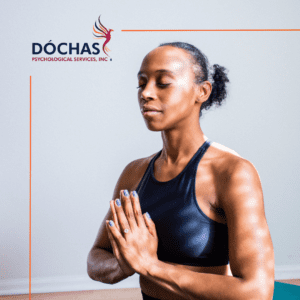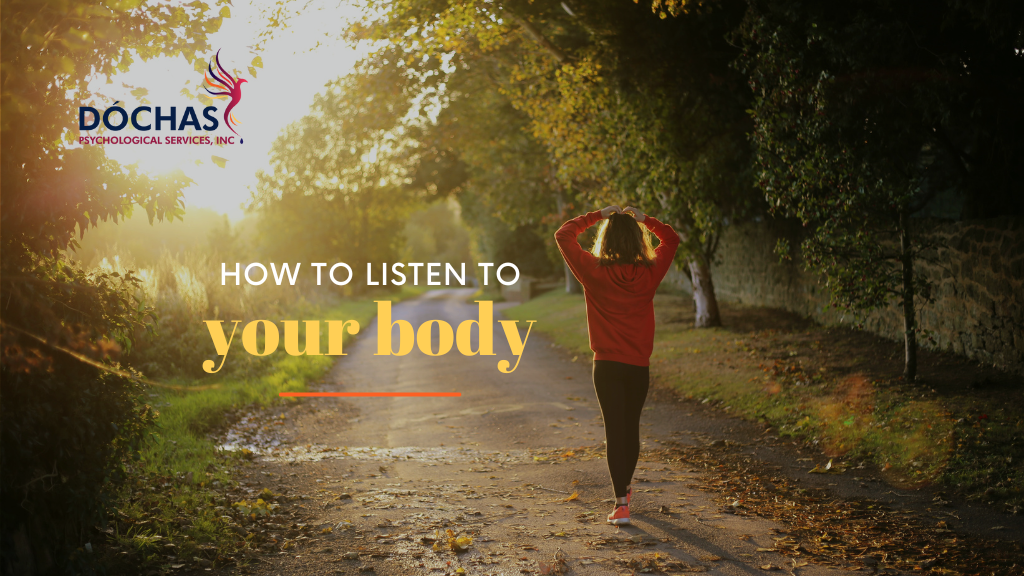You might have heard this saying a lot: “You need to listen to your body.” But in all honesty, what does this even mean? If you haven’t been taught how to listen to your body, you probably don’t know where to even start. It’s Pooja on the Dóchas blog today and I have some tips on how to start.
In my own way, my relationship with my body has not been the easiest. From pushing past limitations with dance to being diagnosed with an autoimmune disease, listening to my body has been a labour of love. But it is something I wish most of us knew about.
Sometimes listening to your body begins with understanding the nervous system. The main function of the central nervous system is to survive. You might have heard of fight, flight or freeze which are ways in which we might respond to threat or novelty in the environment. I would also like to include appeasing and asking for help because they can also help us feel safe around threat and novelty in the environment.

During these responses, our bodies might experience physical sensations as well as emotions, thoughts and perceptions. Depending on the response and after some time passes, you might observe that these sensations rise to a peak and then fall. The challenge occurs when this rise and fall becomes interrupted or incomplete.
Trauma is not just about recalling past memories that were distressing but more so about physical sensations that can hijack your body and make you feel stuck with unbearable or intolerable sensations. This could be why talk-therapy might not seem to be as effective when working with trauma. A growing number of therapies such as EMDR therapy and Somatic Experiencing recognise this and typically focus on body awareness or interoception.
What is interoception? Interoception is an awareness of your bodily sensations that are felt on the inside—for example, hunger sends a signal to rumble your gut so you can support your physical needs. By becoming more aware of these bodily sensations, you can support your understanding of your body.
Now even when your nervous system feels regulated and in balance, you might want to build curiosity to those cues or physical sensations as well. This helps create a nuanced relationship with your body, where it can tell you when you do not feel okay but also can tell you when you do feel okay.
I’d like to guide you through a quick exercise that demonstrates a “how to” that might be a helpful start in listening to your body.
How to listen to your body:
Quick orientation exercise:
- Find a quiet and relaxing space to begin. When you feel ready, notice your breath.
- Find something in your space that feels nice to look at, nice to hear or nice to feel, for whatever reason. Take a few moments with what you have chosen. There is no requirement to think about why you might have chosen it.
- Invite a body scan using your imagination. If it is easier, you could also draw your general body outline on a piece of paper. Starting with your head and working down, note any points where you might feel neutral or positive in response to the thing that seems nice to you. By making space for those sensations first, we can create a neutral or positive relationship with our bodies as opposed to it being the teller of pain, stress and hurt only.
- If sensations of pain, tension and stress are present, take a brief note of those. Gently and slowly guide yourself to return to the part of your body that felt neutral or positive to you and stay with this.
- Take a final cycle of breath while being connected to the thing that felt nice to you and the neutral or positive sensations in your body.
And there you have it, that’s an exercise that can help you begin to listen to your body!

Sometimes it’s not so simple. Sometimes you need a little more help untangling what your body is telling you, and you’d like someone to guide you through this. At Dóchas Psychological Services, we’re here to help. You can reach us at 780 446 0300 or drop us a line at info@dochaspsych.com.
If you’d like a helping hand with building self-esteem, reach out to us here at Dóchas! You can reach us at 780 446 0300 or drop us a line at info@dochaspsych.com.
About Dóchas Psychological
Dóchas Psychological Services is a well-established and trusted therapy clinic located in Spruce Grove, Alberta. At Dóchas we value the idea that everyone deserves a safe space. Through connection and education, our team works hard to build a trustworthy relationship with each of our clients. It is our goal to create a community for our clients to feel like they belong.
Disclaimer
Information provided through Dóchas Psychological Services blogs or vlogs is meant for educational purposes only. They are NOT medical or mental health advice. You can read more about our disclaimer here.

